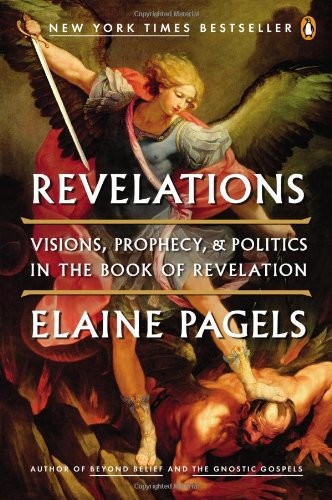
Revelations
Visions, Prophecy, and Politics in the Book of Revelation
کتاب های مرتبط
- اطلاعات
- نقد و بررسی
- دیدگاه کاربران
نقد و بررسی

Starred review from January 9, 2012
Many Christians today believe that the Book of Revelation (which some mistakenly call “Revelations”) was written by the same “John” who wrote the Gospel of John, speaks to an audience of persecuted Christians, and stands in harmony with the rest of the New Testament. In this fascinating study, Pagels challenges all of those assumptions, arguing instead that the visions recorded by John of Patmos function as antiassimilationist harangue that explicitly countered Paul’s teachings that keeping Jewish law was no longer necessary. Pagels situates John of Patmos within a competitive marketplace of New Testament prophets, some of whom had similar prophetic visions that were omitted from the canon but rediscovered in the 20th century. Why did Revelation survive while other revelations were passed over or even suppressed? The answer, she says, lies in the way the prophecy was reinterpreted after Constantine’s unexpected conversion in the early fourth century; Revelation proved surprisingly adaptable even after the Roman Empire turned out not to be the whore of Babylon after all. Pagels offers a sharp, accessible, and perceptive interpretation of one of the Bible’s most divisive books.

February 1, 2012
Multidimensional reading of "the strangest book in the Bible--and the most controversial." The Book of Revelation, a dark and enigmatic account of an apocalyptic end-times vision populated by warring demons and many-headed beasts, has given rise to more competing interpretations than most of the rest of the Bible combined. Even its authorship is disputed, with specialists unsure of whether the John referenced in the text is the Apostle John or a separate individual. Pagels (Religion/Princeton Univ., Reading Judas: The Gospel of Judas and the Shaping of Christianity, 2007, etc.) explores Revelation's outsized role in the development of Christian thought and places it in the context of its creation. Arguing that its language depicting battles in heaven and destruction on earth is a thinly veiled political screed against the pagan Roman Empire, Pagels identifies John as a Jewish refugee from Jerusalem following the destruction of the Temple. Viewing the Book through the prism of the Gnostic Gospels and the other accounts of prophetic visions that proliferated at the time, she advances the modern theory that Revelation is a Jewish Christian document fighting back against Paul's mission to abrogate Jewish law and bring Christ's message to the Gentiles. Pagels' compelling, carefully researched analysis brings to life the multitude of factions that quickly arose in the nascent Christian community after the death of Jesus. The struggle to canonize Revelation was intensely controversial; to this day, believers fight over how to interpret the vision of John of Patmos, "reading their own social, political, and religious conflict into the cosmic war he so powerfully evokes." Scholarly but widely accessible, the book provides a solid introduction to the one book of the New Testament that claims to be divinely inspired.
COPYRIGHT(2012) Kirkus Reviews, ALL RIGHTS RESERVED.

October 1, 2011
Pagels, who changed forever how we look at Christianity with books like The Gnostic Gospels, here rethinks the Book of Revelation, which has always been regarded as a near-fantastic vision of the world's end. Pagel instead sees it as an attack on Roman decadence at a time when Jews were rebelling against the Roman occupation of Jerusalem. Only later was it repurposed by the emerging Christian sect as a sword thrust to anyone challenging its primacy. Of tremendous interest to educated readers.
Copyright 2011 Library Journal, LLC Used with permission.

Starred review from January 1, 2012
The preeminent scholar of the early-Christian-period sacred writings found at Nag Hammadi, Egypt, in 1945 uses them as well as the Bible to illuminate the New Testament's last book, which almost wasn't added to the canon because, Pagels explains, it conflicted with the Pauline epistles. For it revived the argument over how Judaistic the Gentiles in the Jesus movement had to be, which Paul had answered conclusively in Galatians. The visionary tract squeaked into the NT only when fourth-century bishops saw that, if the aim of its wrath was shifted from Gentiles and their advocates to those who fit in the new category of heretics, it could help with consolidating the institutional church. But how Revelation made the cut is only one of Pagels' revelations about it. She also discloses the extent to which it extrapolates from the prophetic tradition of Ezekiel, Isaiah, Jeremiah, and Daniel; its status as one of many similarly visionary texts, typically also called Revelation and more Gnostic, found at Nag Hammadi; its primary purpose as anti-Roman propaganda intended to rally continuing Jewish resistance after the destruction of the temple in Jerusalem; and its modern role in fostering hope in the face of seemingly ultimate cataclysm. A lot for so little a book to do, but, thanks to Pagels' sublimely fluent exposition, not too much.(Reprinted with permission of Booklist, copyright 2012, American Library Association.)

























دیدگاه کاربران